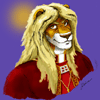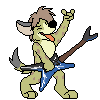
Was in a poor mood today so decided to do up a picture of my Pathfinder group to see if cranking out a moderately elaborate thing would help.
Left to right; human inquisitor of Cayden Cailean (and yes - that's her holy symbol she's holding), halfling cleric of Desna, tengu sorcerer, half-orc cavalier, kobold rogue, human ranger, half-orc monk (he's described as not having any obvious signs of monastacism; he's simply a very committed martial artist).
Left to right; human inquisitor of Cayden Cailean (and yes - that's her holy symbol she's holding), halfling cleric of Desna, tengu sorcerer, half-orc cavalier, kobold rogue, human ranger, half-orc monk (he's described as not having any obvious signs of monastacism; he's simply a very committed martial artist).
Category Artwork (Digital) / Fantasy
Species Unspecified / Any
Size 1200 x 962px
File Size 279.8 kB
Mix of things;
* to some extent, D&D carries a particularly American idealism. Diverse groups of people can get together to resolve problems,and go from impoverished pariahs to comfortable academics, churchmen, and societal leaders. Sort of this weird mix of 30s/40s ideals suddenly slammed into Old West morality. I think you could probably get a whole sociology paper out of the undertones that informed Gygax and crew...
* at a different level, D&D/Pathfinder promptly undercuts that by making it so that the only really okay people are all "folks who look like us" - short people, people with pointed ears, short people with pointed ears.
* but wait, because most people who play RPGs are misfits. There's this tendency to see the alien other as admirable. There's only so long before an opponent is introduced within any fandom before that opponent becomes sympathetic to the fans. If the opponent is granted an honor code of any sort they quickly become The Honorable Alien Culture Guy. It was inevitable that people would want to play the monsters.
* which is something old-skool D&D designers never understood. Gaming roots in mechanics means that initially designers felt that if you wanted to play a monster it was like anything else - you were doing it for the power. They didn't get it. 4e's designers seem to better understand that people play the monsters because monsters are cool. Throw a player a +2 somewhere, a -2 somewhere, and a power instead of an extra feat, and they're perfectly happy as long as they get to be a bird or lizard or whatever. They get it.
* which finally seems more appropriate in some ways to the society of this age. We are a very diverse band of misfits trying to get somewhere in this hostile world.
* to some extent, D&D carries a particularly American idealism. Diverse groups of people can get together to resolve problems,and go from impoverished pariahs to comfortable academics, churchmen, and societal leaders. Sort of this weird mix of 30s/40s ideals suddenly slammed into Old West morality. I think you could probably get a whole sociology paper out of the undertones that informed Gygax and crew...
* at a different level, D&D/Pathfinder promptly undercuts that by making it so that the only really okay people are all "folks who look like us" - short people, people with pointed ears, short people with pointed ears.
* but wait, because most people who play RPGs are misfits. There's this tendency to see the alien other as admirable. There's only so long before an opponent is introduced within any fandom before that opponent becomes sympathetic to the fans. If the opponent is granted an honor code of any sort they quickly become The Honorable Alien Culture Guy. It was inevitable that people would want to play the monsters.
* which is something old-skool D&D designers never understood. Gaming roots in mechanics means that initially designers felt that if you wanted to play a monster it was like anything else - you were doing it for the power. They didn't get it. 4e's designers seem to better understand that people play the monsters because monsters are cool. Throw a player a +2 somewhere, a -2 somewhere, and a power instead of an extra feat, and they're perfectly happy as long as they get to be a bird or lizard or whatever. They get it.
* which finally seems more appropriate in some ways to the society of this age. We are a very diverse band of misfits trying to get somewhere in this hostile world.
http://pathfinder.wikia.com/wiki/Cayden_Cailean
... as the player's so fond of telling us, the god grants worshippers the ability to instantly make fairly decent beer where most divine casters are limited to instantly creating clean water.
... as the player's so fond of telling us, the god grants worshippers the ability to instantly make fairly decent beer where most divine casters are limited to instantly creating clean water.
Wow! Whenever I see any of your D&D-ish artworks I am always inspired to go dig out my Rping guide books and all the notebooks I have filled with characters, cities and worlds where I can lose myself in sword-play, magic and sheer jaw-dropping wonder.
Thanks very much Leucrotta for posting this.
Thanks very much Leucrotta for posting this.
For my friend to play another half-orc wasn't too surprising; I was a lot more surprised that he went with a monk! But I don't know the cavalier's player that well, so that was a surprise.
I actually like both Pathfinder and 4e for "crunch" - Pathfinder manages to give players more power and options while keeping 3e/3.5 ideas, and even though 4e largely discards that, it winds up being really nice, streamlined, playable system. But I feel Pathfinder definitely has better "fluff" as 4e's kinda-sorta-Forgotten-Realms setting just feels very generic to me. This isn't so much a problem in game - 4e's a good system and you can convert adventures over fast! But if I wanted to grab a game supplement or module and read it, just for fun without a game in sight, it'd be Pathfinder and not 4e.
I actually like both Pathfinder and 4e for "crunch" - Pathfinder manages to give players more power and options while keeping 3e/3.5 ideas, and even though 4e largely discards that, it winds up being really nice, streamlined, playable system. But I feel Pathfinder definitely has better "fluff" as 4e's kinda-sorta-Forgotten-Realms setting just feels very generic to me. This isn't so much a problem in game - 4e's a good system and you can convert adventures over fast! But if I wanted to grab a game supplement or module and read it, just for fun without a game in sight, it'd be Pathfinder and not 4e.
For me, part of the 2nd edition's charm was actually in house rules (over the hit mechanic, mostly, to liken the 3rd edition) and in building characters with the nonweapon proficiencies to flesh them out. It's funny and so true that they went with that name for skills. Also, there was a bit of ambiguity over some things which suited our gaming group's style of just swifly coming up with agreement on a roll and then dealing with it. DM word was final but rarely called.
People seem to play more like computer games these days with all the minmaxing going on, and games seem to be steadily designed to both expect and even encourage it, something I have mixed feelings about. If someone wanted to roll a brawny mage or a sneaky fighter, they could go right ahead, and players could choose their adventures and pick their fights most of the time through roleplayed dialog. Having a "negotiation skill" is a bit awkward unless a player acts it out more than uses it for rolling. Same goes with other social skills.
It's a while since I opened a boxed adventure module, they don't really print those any longer. Just about every game store (of the few that were, that is) used to have at least some boxed adventures and a mishmash of locally printed/photocopied adventure booklets of unfortunately variable quality! I really need to look into Pathfinder for its clever revision/rewrite of the evolved classic rules, but also because of that society scenario style where each game should be only a few hours and full of adventure.
Episode style play, too, when I ran Heavy Gear each game evening was formatted like a TV episode, together with the players' consent, with a few earlier prepared plot snags, NPCs and clues to make things fluent despite the players choices of progress. Might have to look through the notes I wrote at that time, and cease rambling - looks like it's easy to get carried away with a topic like this. :>
People seem to play more like computer games these days with all the minmaxing going on, and games seem to be steadily designed to both expect and even encourage it, something I have mixed feelings about. If someone wanted to roll a brawny mage or a sneaky fighter, they could go right ahead, and players could choose their adventures and pick their fights most of the time through roleplayed dialog. Having a "negotiation skill" is a bit awkward unless a player acts it out more than uses it for rolling. Same goes with other social skills.
It's a while since I opened a boxed adventure module, they don't really print those any longer. Just about every game store (of the few that were, that is) used to have at least some boxed adventures and a mishmash of locally printed/photocopied adventure booklets of unfortunately variable quality! I really need to look into Pathfinder for its clever revision/rewrite of the evolved classic rules, but also because of that society scenario style where each game should be only a few hours and full of adventure.
Episode style play, too, when I ran Heavy Gear each game evening was formatted like a TV episode, together with the players' consent, with a few earlier prepared plot snags, NPCs and clues to make things fluent despite the players choices of progress. Might have to look through the notes I wrote at that time, and cease rambling - looks like it's easy to get carried away with a topic like this. :>

 FA+
FA+



















Comments